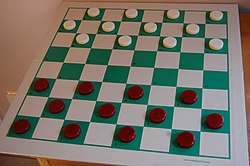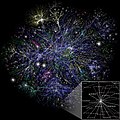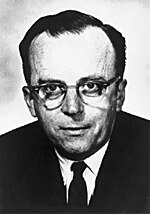Christopher S. Strachey (/ˈstreɪtʃi/; 16 November 1916 – 18 May 1975) was a British computer scientist. He was one of the founders of denotational semantics...
29 KB (2,656 words) - 03:20, 13 June 2025
Checkers (video game) (redirect from Christopher Strachey's Checkers Program)
Draughts, is a 1952 video game developed by British computer scientist Christopher Strachey. It is one of the first computer programs in the early history of...
23 KB (2,504 words) - 03:24, 28 July 2025
England. William Strachey the English writer William Strachey (c. 1596/97–1635) John Strachey (d. 1674), friend of John Locke John Strachey (geologist) (1671–1743)...
6 KB (770 words) - 11:48, 2 April 2025
nicknamed by some as "Cambridge Plus London" or "Christopher's Programming Language"). Christopher Strachey, David Barron and others were involved in its...
7 KB (701 words) - 04:40, 3 July 2025
Programming Languages were an influential set of lecture notes written by Christopher Strachey for the International Summer School in Computer Programming at Copenhagen...
3 KB (251 words) - 18:28, 28 May 2025
In 1952, Christopher Strachey wrote a combinatory algorithm for the Manchester Mark 1 computer which could create love letters. The poems it generated...
6 KB (691 words) - 02:59, 28 May 2025
polymorphism and parametric polymorphism were originally described in Christopher Strachey's Fundamental Concepts in Programming Languages, where they are listed...
17 KB (1,862 words) - 06:35, 16 March 2025
him the Turing Award in 1976, while his collaborative work with Christopher Strachey in the 1970s laid the foundations of modern approaches to the semantics...
14 KB (1,335 words) - 00:18, 2 June 2025
University of Oxford), following the death of Christopher Strachey. He became the first Christopher Strachey Professor of Computing on its establishment...
27 KB (2,222 words) - 04:11, 21 July 2025
The concept of first- and second-class objects was introduced by Christopher Strachey in the 1960s. He did not actually define the term strictly, but contrasted...
11 KB (999 words) - 20:01, 27 December 2024
several notable advances in game artificial intelligence. In 1951 Christopher Strachey created Checkers, a simulation of the board game. The checkers game...
47 KB (3,420 words) - 18:42, 29 July 2025
Christopher Haden-Guest, 5th Baron Haden-Guest (born 5 February 1948), known professionally as Christopher Guest, is a British-American actor, comedian...
38 KB (2,368 words) - 05:27, 30 July 2025
computers provide computing power to organizations in their region. Christopher Strachey, who became Oxford University's first professor of computation, filed...
37 KB (4,157 words) - 09:09, 21 July 2025
Denotational semantics (redirect from Scott-Strachey semantics)
originated in the work of Christopher Strachey and Dana Scott published in the early 1970s. As originally developed by Strachey and Scott, denotational...
32 KB (3,768 words) - 00:41, 12 July 2025
development was the product of three men: W. S. (Bill) Elliott (hardware), Christopher Strachey (software) and Bernard Swann (marketing and customer support). It...
14 KB (1,540 words) - 15:22, 23 July 2025
The PRG was founded by Christopher Strachey (1916–1975) in 1965. It was originally located at 45 Banbury Road. After Strachey's untimely death, C.A.R....
5 KB (506 words) - 14:46, 18 January 2024
ordinary variables with a function type. The term was coined by Christopher Strachey in the context of "functions as first-class citizens" in the mid-1960s...
28 KB (2,525 words) - 16:04, 30 June 2025
using the Ferranti Mark 1 machine of the University of Manchester, Christopher Strachey wrote a checkers program and Dietrich Prinz wrote one for chess....
172 KB (19,994 words) - 17:08, 22 July 2025
telephone lines at a speed of 110 bits per second (bit/s). In 1959, Christopher Strachey filed a patent application for time-sharing in the United Kingdom...
101 KB (11,934 words) - 19:30, 26 July 2025
June 1959 in Paris, and is now considered the first IFIP Congress. Christopher Strachey gave a paper "Time Sharing in Large Fast Computers" at the conference...
35 KB (4,158 words) - 08:32, 24 July 2025
to simplify a program and thus make its result more clear. Christopher Strachey, Christopher P. Wadsworth and John C. Reynolds brought the term continuation...
27 KB (3,043 words) - 15:10, 27 June 2025
later successfully reconstructed. OXO, along with a checkers game by Christopher Strachey completed around the same time, is one of the earliest known games...
9 KB (934 words) - 01:34, 18 July 2025
of an Applicative Language to Combinatory Logic", supervised by Christopher Strachey and Dana Scott. He held professorships at Queen Mary College, London...
10 KB (845 words) - 05:50, 28 January 2025
although Arthur Samuel's checkers program was released earlier. Christopher Strachey also wrote a checkers program in 1951 "Allen Newell, 65; Scientist...
17 KB (1,540 words) - 17:48, 27 April 2025
Ray Strachey (born Rachel Pearsall Conn Costelloe; 4 June 1887 – 16 July 1940) was a British feminist politician, artist and writer. Her father was Irish...
17 KB (1,561 words) - 12:48, 29 March 2025
Bolt Beranek and Newman in 1957. He learned about time-sharing from Christopher Strachey at a UNESCO-sponsored conference on Information Processing in Paris...
31 KB (3,274 words) - 11:06, 1 November 2024
Williams, M., eds., Proceedings of KR-2002, 615–628. Biography portal Christopher Strachey, filed a patent for time-sharing in early 1959 Cornucopian Frame...
35 KB (3,210 words) - 15:40, 30 July 2025
Manchester in the autumn of 1951. The music program was written by Christopher Strachey. Among the earliest group of electric musical instruments in Japan...
148 KB (16,276 words) - 09:49, 28 July 2025
general purpose. Examples included SAGE (1958) and SABRE (1960). Christopher Strachey, who became Oxford University's first Professor of Computation, filed...
200 KB (22,250 words) - 21:40, 6 June 2025
Computer Science at University College London. He was previously the Christopher Strachey Professor of Computing at Wolfson College, Oxford, from 2000 to 2021...
13 KB (1,142 words) - 14:26, 6 July 2025














